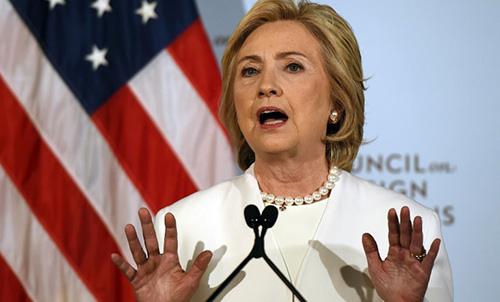Clinton backs sweeping US-led global fight against IS
Hillary Clinton called Thursday for a US-led global fight to defeat the Islamic State group and shut down its flow of fighters, propaganda and weapons in the wake of the Paris attacks.
The lead Democratic presidential candidate outlined a three-pronged strategy to defeat IS, disrupt and dismantle the infrastructure that facilitates the flow of arms, fighters and propaganda across the world, and to bolster international defenses against radical jihadism.
It would require every pillar of American power -- military, diplomacy and economic development -- she said, in a sweeping speech that called on Arab and European allies to do more.
"The entire world must be part of this fight, but we must lead it," she told the Council on Foreign Relations think tank in New York.
She called for a more effective and broader US-led coalition to intensify air strikes on IS targets in Syria and Iraq, an intelligence surge and a no-fly zone to stop the Syrian regime bombing civilians.
The relatively hawkish Clinton stopped short of calling for a large-scale US military deployment on the ground, instead demanding greater support for local and regional ground forces.
She called for political pressure to lay the groundwork for a second Sunni awakening in Iraq to join the fight and said the United States needed to work with Russia to enforce a no-fly zone.
Twice she singled out Turkey.
"We need to get Turkey to stop bombing Kurdish fighters in Syria who are battling ISIS and become a full partner," she said while also calling on Ankara to lock down its porous border with Syria.
The Saudis, Qataris and others need to stop citizens from directly funding extremist organizations, and the UN Security Council needs to update its terror sanctions list, she said.
After the 9/11 attacks, she said the United States had made a lot of progress breaking down barriers but that Europe was "way behind."
"The United States must work with Europe to dramatically and immediately improve intelligence sharing and coordination," she said.
"European nations don't always alert each other when they turn away a suspected jihadist or when a passport is stolen," she said.
"Too often the dots never get connected. I appreciate how hard this is, but this has to change."
Turning to encryption, she called on Silicon Valley "not to view government as an adversary" and to "develop solutions that will keep us safe and protect our privacy."
She also spoke about the need to combat radical jihadism more broadly and that ordinary Muslims cannot be considered a threat.
"We are in a contest of ideas against an ideology of hate and we have to win. Let's be clear though, Islam is not our adversary," she said.
Related Posts

